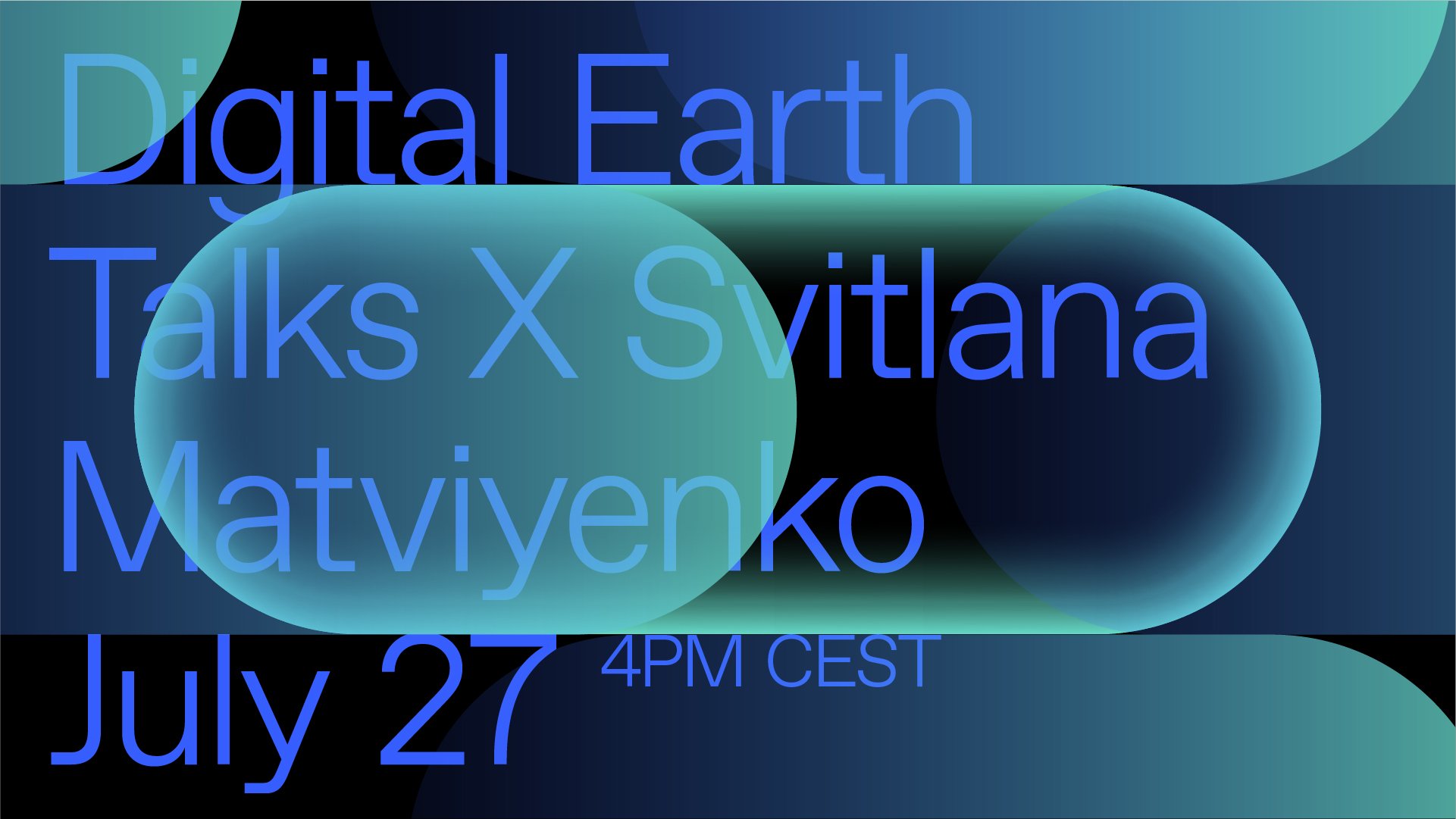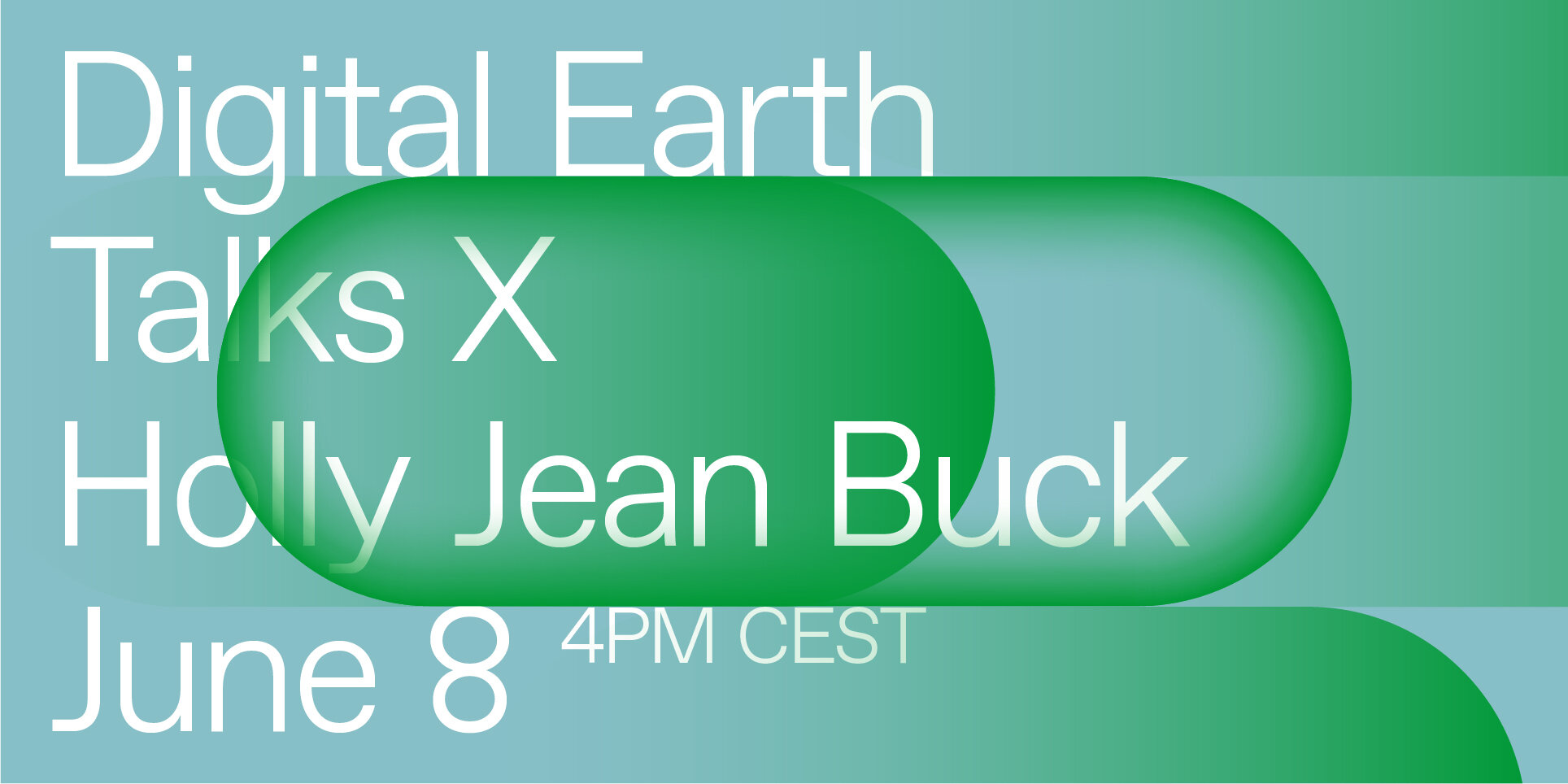Recap Digital Earth Talks 2021
Final Reflection on the Digital Earth Talks Series
by Nora N. Khan
The challenge of moderating the Digital Earths Talks – bringing artists and scholars from around the world, with deeply invested practices thinking around artificial intelligence, play, the history of computation, and experimental media – was a significant one. Every two months or so through a most difficult year, the Digital Earth Fellows were asked to watch recorded talks by an invited guest – a major international scholar or theorist – and reflect on the theorist’s ideas in relation to their practices, read suggested texts and pieces of theory, and in a few cases, poetic offerings, and then, be in discussion with the thinker live, and in public, broadcast across the digital earth.
Each thinker’s ideas and arguments were meant to resonate on a few levels with each Fellow’s practice, and provide a space for provocation, challenge, and debate about what a humane Digital Earth to come might look like. Within that driving question, from session to session, were other questions: what did it mean to be humane? What would a ‘digital earth’ look like in the future, especially with the evolution of machine learning and AI, and increasing difficulty in demarcating the infrastructure and precisely intentional design of the digital sphere, as its blueprints have become only more removed and remote and proprietary – ensconced – from a general public?
And further, how would the Fellows consider questions of alternative cosmologies, of cyberwar, of alternative knowledge structures, of carbon removal’s information control structures, in relation to their work, and in relation to scholars whose views might challenge their own views? It went without saying that the Digital Earth Fellows were critically engaged, present, deeply thoughtful, and their collective interrogations – and negotiation of the space in which we all entered, from our respective backgrounds, contexts, and positions, and ideas – was essential to the feeling of an actively negotiated and mutual public discourse. It also formed a rich set of building instances of thinking in public together. In watching the talks back over again, I find I can also pin the impasses and challenging points of each conversation to the larger digital and technological space in which we sat, which exchanges intimacy for performance, and nudges, even encourages adversarial debate.
The result is five epic conversations which allowed for ruptures and fissures that would not have been possible in person.
As moderator, I took great pleasure in strategizing the flow of these two-hour conversations and talks, in having continual studio artist visits with Fellows, and understanding different attendant ideologies, and attitudes, and ideas about technology that were at play. Some call this the ‘back room’ or back hall of moderation work, the research and time that goes into trying to maintain a space which is ideally meant to click along. But it’s the shifts in artistic practice, the differences in ideology, that also shape the conversation, demanding a shapeshifting role as moderator, toggling as a curator does, between practices. And moderation in this case was largely about shepherding in critical questions and provide a narrative structure, especially at key turning points, and hopefully create a space in which a watching public could feel a lot of agency and connection to the more academic topics, shrouded as they can be in distancing and technical language.
Pairing a large group of Fellows from around the world with a new scholar, and creating a sense of organic discussion and exchange while live in the highly contained, demarcated, and pre-set space of Zoom, before guests numbering over 100 on solid attendance days, was a logistical and conceptual strategy game. One was often mediating between multiple different registers - the needs and questions of the audience, the changing practices and interests of the Fellows, and most of all, the nuanced and shifting politics of the digital space. Of course, this is unsurprising; nearly every Fellow has the pre-set, unseen, or unspoken dynamics of digital and technological spaces as one of their interests. For these dynamics to play out, and challenge our best intentions and maybe even unstated desires for tidy discourse and arguments that could be wrapped in a bow, should have been no surprise.
The context was vital. The complexity of Web3 tumbling in, the massive crash course in surveillance and contact tracing that was 2020 and 2021, the collective negotiation of changing simulations of public health, all primed the audience, fellows, and invited thinkers to rigorously theorize and also, unveil, the unseen and hidden aspects of technological design, paired with strange, emergent, and deeply neoliberal conceptions of the human. They were also pitted, a bit, in seeming opposition to each other, with the challenge being clear: to be an invited thinker from one locale, one specific set of training, and then be in conversation with artists from across the world and with a representative from most all of the continents, would result in natural questions of “Who is We?” in any given conversation, and, from what positions were the Fellows and thinkers speaking, and by whose design, and to what end?
In watching, and rewatching these talks, we might remember how they were made more exquisitely difficult by the pandemic and yet also, exquisitely necessary.
This roving criticality was vital for each conversation, and a rare one in my experience - a rare honor and treat, that is. This collective criticality felt emblematic of the kind of group criticism needed to evaluate, construct, and think through the stakes of a coming Digital Earth that is humane, that tends and arcs towards justice. It takes many voices, many critiques, and many critical positions informed by context, historical experience, and rich artistic practice to evaluate the ways the online landscape is weaponized as psychological fuel, to understand how algorithms nudge us ever closer to embracing and reifying our own tastes to ourselves, to see how predictive systems make it harder and harder to imagine outside what correlates and is likely. An effective technological critique is active, on the move, and looks back collectively at an eye and system that is collectively engineered.
The Digital Earth Fellows’ restless criticality rarely allowed for any passing statements to go unquestioned, any claims to be made without being considered in relation to the group as a whole. This was hard work to do collectively, especially when the default is a quick set of insights, a few closing points, end of discussion > save recording. Instead, the critical understanding of the group of the menace and threats of such smoothness, of easily accepting a screed or piece of theory, without seeking praxis, as Chakanetsa insisted, or examining the language used, as Maya argued, was fuel for the iterative improvement and added dimensions to each discussion.
Case in point: it was, wonderfully, impossible to make passing statements about a “we” or an “us,” or any statement on the unfettered promise of technological progress or good, because the collected group had their fingers on the pulse of what such language has meant in the past, and what it means in the present. Active, restless, and roving, the group came to each thinker with piercing, thoughtful questions, and probed and unfolded and critiqued and reconstituted a space back together with each again. The result is five epic conversations which are knotty, which challenged each thinker, which drew on the affordances, for lack of a better term, of such a fluid digital space, but also allowed for ruptures and fissures that would not have been possible in person. In watching, and rewatching these talks, we might remember how they were made more exquisitely difficult by the pandemic and yet also, exquisitely necessary, and what a profound opportunity it was for a group so brilliantly and critically invested in investigating the logic of networks to come together at this most concentrated time of network immersion. To think about multiple futures, cosmologies, platforms, internets, and digital earths, the Digital Earth Fellows and their respective practices demanded we apply context, locality, an understanding of position, to practice relational thinking, and to learn to think together to tackle the crises to come.
Recap Digital Earth Talks 2021
About Digital Earth Talks
How do we imagine a humane Digital Earth to come? Join the discussion and explore the visions of leading voices in art, tech, and philosophy from around the world.
Discover our past events here:











